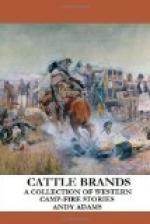When they learned that he was the son of the owner of the grant, and that he wanted to spend a few months hunting and looking about, they considered themselves honored. The best jacal in the group was tendered him and his interpreter. The food offered was something new, but the relish with which his companion partook of it assisted young Wells in overcoming his scruples, and he ate a supper of dishes he had never tasted before. The coffee he declared was delicious.
On the advice of his companion they had brought along blankets. The women of the ranchito brought other bedding, and a comfortable bed soon awaited the Americanos. The owner of the jacal in the mean time informed his guest through the interpreter that he had sent to a near-by ranchito for a man who had at least the local reputation of being quite a hunter. During the interim, while awaiting the arrival of the man, he plied his guest with many questions regarding the outside world, of which his ideas were very simple, vague, and extremely provincial. His conception of distance was what he could ride in a given number of days on a good pony. His ideas of wealth were no improvement over those of his Indian ancestors of a century previous. In architecture, the jacal in which they sat satisfied his ideals.
The footsteps of a horse interrupted their conversation. A few moments later, Tiburcio, the hunter, was introduced to the two Americans with a profusion of politeness. There was nothing above the ordinary in the old hunter, except his hair, eyes, and swarthy complexion, which indicated his Aztec ancestry. It might be in perfect order to remark here that young Wells was perfectly composed, almost indifferent to the company and surroundings. He shook hands with Tiburcio in a manner as dignified, yet agreeable, as though he was the governor of his native State or the minister of some prominent church at home. From this juncture, he at once took the lead in the conversation, and kept up a line of questions, the answers to which were very gratifying. He learned that deer were very plentiful everywhere, and that on this very tract of land were several wild turkey roosts, where it was no trouble to bag any number desired. On the prairie portion of the surrounding country could be found large droves of antelope. During drouthy periods they were known to come twenty miles to quench their thirst in the Salado, which was the main watercourse of this grant. Once Tiburcio assured his young patron that he had frequently counted a thousand antelope during a single morning. Then there was also the javeline or peccary which abounded in endless numbers, but it was necessary to hunt them with dogs, as they kept the thickets and came out in the open only at night. Many a native cur met his end hunting these animals, cut to pieces with their tusks, so that packs, trained for the purpose, were used to bay them until the hunter could arrive and dispatch them with a rifle. Even this was always done from horseback, as it was dangerous to approach the javeline, for they would, when aroused, charge anything.




